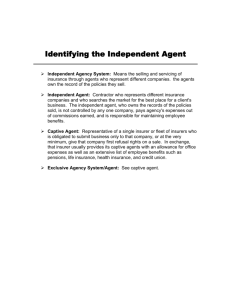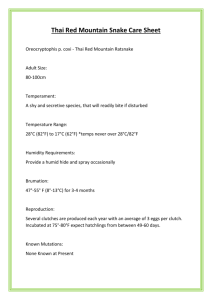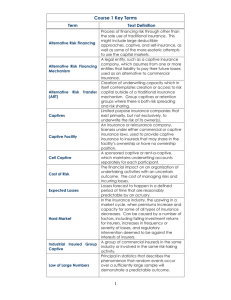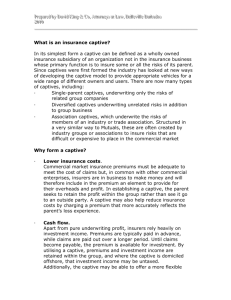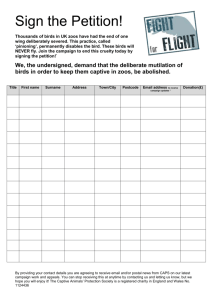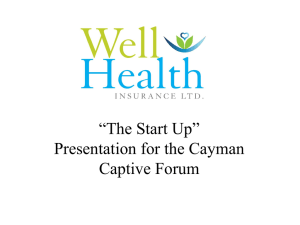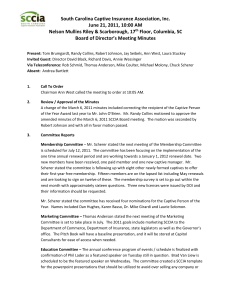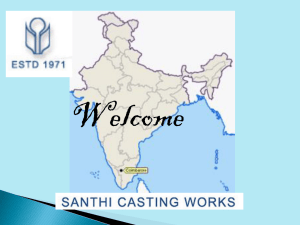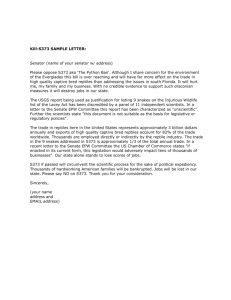Types of Agency Distribution Models Independent Agency System
advertisement
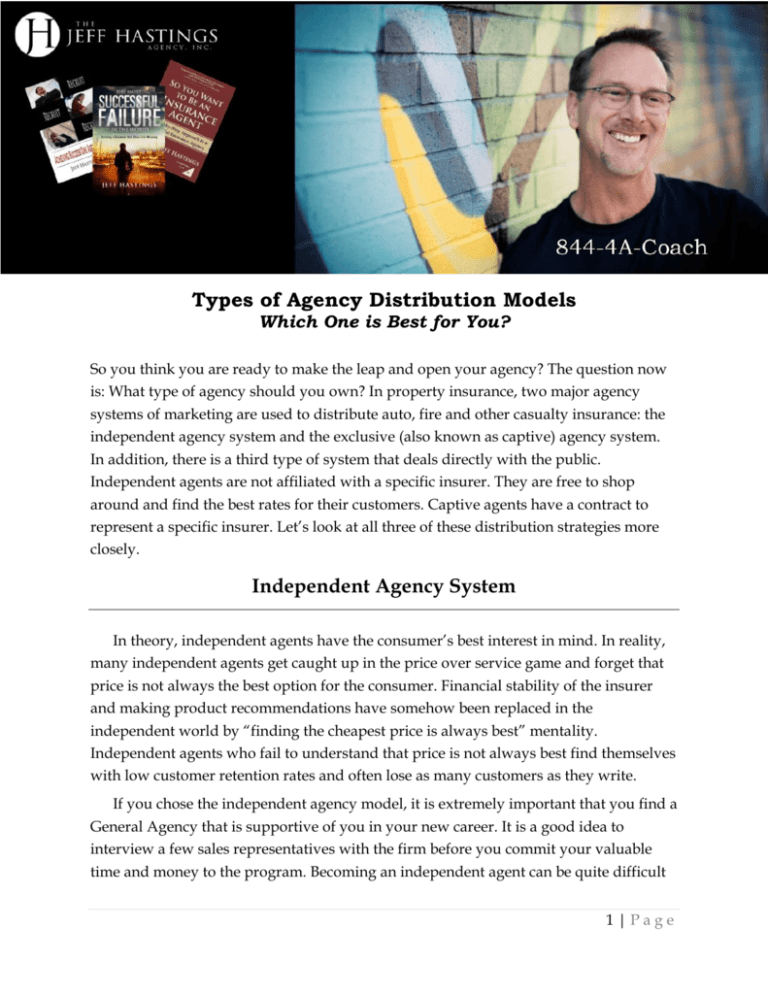
Types of Agency Distribution Models Which One is Best for You? So you think you are ready to make the leap and open your agency? The question now is: What type of agency should you own? In property insurance, two major agency systems of marketing are used to distribute auto, fire and other casualty insurance: the independent agency system and the exclusive (also known as captive) agency system. In addition, there is a third type of system that deals directly with the public. Independent agents are not affiliated with a specific insurer. They are free to shop around and find the best rates for their customers. Captive agents have a contract to represent a specific insurer. Let’s look at all three of these distribution strategies more closely. Independent Agency System In theory, independent agents have the consumer’s best interest in mind. In reality, many independent agents get caught up in the price over service game and forget that price is not always the best option for the consumer. Financial stability of the insurer and making product recommendations have somehow been replaced in the independent world by “finding the cheapest price is always best” mentality. Independent agents who fail to understand that price is not always best find themselves with low customer retention rates and often lose as many customers as they write. If you chose the independent agency model, it is extremely important that you find a General Agency that is supportive of you in your new career. It is a good idea to interview a few sales representatives with the firm before you commit your valuable time and money to the program. Becoming an independent agent can be quite difficult 1|Page at first. Most insurance companies who broker policies through independent agencies require large sales volume to maintain agent appointments. Since most new independent agents cannot produce the required volume of new sales, many new independent agents actually become sub-producers for large general agencies. General Agencies (GA) usually charge between ten to twenty percent of your total commissions for their services. This is not uncommon and can be a great value – if you partner with a GA that does more for you than simply provide market access. The benefit of opening an independent agency is being able to choose which authorized company to use. If one of the companies you represent is not competitive, you can simply shop around to place your policies with a more desirable carrier. Also when you decide to leave the business or retire, you may have the right to sell your agency on the open market. Finally, in a hardened market (where insurers tighten up underwriting guidelines to offset losses), the independent agent has more choices of companies to underwrite new policies. This can be extremely beneficial for you if your agency is in an area which suffers catastrophic losses and insurers are always making underwriting changes to limit market growth. The downside of being an independent agent is: You may need more employees to process the many new applications that are needed when you move customers between companies. You will have to understand the forms, applications and procedures of many different companies. You will lose your customers who seek brand loyalty. Since you may be selling price over service, your customers will learn to shop for a better rate at renewal, which increases the need to constantly write new business. Many of the independent agents I know are great people and truly believe they have the customer’s best interest in mind when shopping for the lowest cost for the consumer. Sure, a home policy is a home policy, but companies can be significantly different. Often, it is not until customers file a claim that you find out they do not have the coverage they need or the company will not deliver on its promises. 2|Page Captive Agency System In most cases, captive agents represent one or two primary companies. Like the independent agent, being a captive agent also has its advantages and disadvantages. The major disadvantage of being a captive agent is you are at the mercy of your carrier if the company chooses to stop writing certain types of coverage or is not competitive. Very few captive companies offer a modified contract which allows agents to broker ineligible business. Even fewer allow you to transfer the agency to a qualified family member or sell it on the open market upon retirement. If you are going to choose this agency model, look for a captive company who allows you to broker ineligible business to an outside market, transfer your agency to a family member and receive compensation when you retire. The advantages of being a captive agent include: Brand recognition Intensive training programs Financial incentive programs at start-up Ease of use (only one company set of forms, applications and procedures) Less work to service accounts A team of agents or managers to help you when you need it most This is not to mention the personal relationship you form with the company of choice. If you want to develop personal relationships with your customers and offer advice-based sales, a captive agency may be your best choice. 3|Page Direct Writers Direct insurance companies sell their policies to the consumer without an agent acting as middle man. Direct companies made their push in the marketplace as the Internet boom began dominating the media. Many corporations feared the worse believing that one day the middle man would be cut out of the equation—insurance agents were no exception. The direct writing companies have captured a significant share of the auto insurance market over the past fifteen years with most of their new sales being made to a younger audience. However, in the May 2007 issue of Insurance Journal, a study conducted by Focalyst, a market research and consulting firm, showed that baby boomers remain loyal to a brand of insurance. The article went on to say: Baby boomers may be more likely to switch brands across a wide variety of products and services, including apparel, cars, prepared foods, and airlines, but when it comes to service oriented categories such as banking and insurance companies, boomers stay loyal to brand. Boomers are most loyal when companies give customized service…and are willing to pay more for value if a product or service demonstrates the ability to help make their complicated and stressful lives easier. I don’t believe baby boomers are much different from any other group of people. Younger people are more prone to shop on the Internet and choose price over service. When people get older and have more assets to protect, most will demand a relationship built on service instead of price. Quite simply, people who use independent agencies and direct writers are shoppers. There is a reason why GEICO has an annual advertising budget of over $900 million! When you build an agency on price over service, your agency will experience high turnover as your customers shop for a competitive price on each renewal. Aggressive captive agents overcome this dilemma by offering value- added service at a competitive price. 4|Page Distribution Channel Summary Thirty years ago, there was no argument about which type of distribution channel to choose. Because of the complex nature of our business most people prefer to purchase insurance from someone they trust. Captive agents ruled the market, and most policies were sold at the kitchen table. In the mid to late 80s, everything changed. With the Internet boom, insurance companies started jumping on the band wagon, promising discounted prices and faster service. Independent agencies offered to bridge the gap by shopping for the best deal for consumers while continuing to offer advice-based service. To survive, every company entered this price war looking for new ways to grow. This price-instead-of-service trend is not specific to the insurance industry. Banks have begun treating us like numbers, computers are made to be disposable and, when calling most companies, the only way you can reach a live person is by going through an automated phone system and pressing zero fifteen times! The customer has somehow been lost in the shuffle. All of this has been done while, in fact, many consumers admit they would pay more to have good quality service. When it comes to insurance, customers only shop with direct writers when captive and independent agents alike fail to provide advice-based service. Most customers want and need a recommendation. Here is a chart that may help you make this very important decision regarding which distribution channel fits you. Keep in mind that if you have a family or dependents that rely on you financially, the most important factor in your decisionmaking process may be the ability to transfer your agency to a family member upon death or retirement. 5|Page Distribution Channel Benefits Benefit Independent Captive Relationship-driven sales Transactional sales X X X X X Ease of doing business Competitive pricing Modified Captive X Close relationship with carrier X X X X X Brand recognition X X Low service work X X Some Some Training and field support Transfer of agency upon termination Some X Making the decision on which channel and carrier to represent is one of the most important decisions you can make when entering the insurance business. While there may not be a right or wrong answer here, there are a few things you need to once again consider. First of all, you need to identify your target market. If your natural market niche is highly price sensitive when it comes to insurance, the IA channel may be the best option. If your target market is not as price sensitive and seeks a large reputable brand and are willing to pay more for quality service, the Captive or Modified Captive channel could be a better fit for your agency. Both are very good options to choose from and I highly recommend conducting a thorough investigation with both before signing a contract. All of the information provided above were taken out of Jeff Hastings book titled, So You Want to be an Insurance Agent – 3rd Edition. Click on the header on page 1 to visit Jeff’s author page where printed copies, an eBook and Audio Book are available at Amazon.com. 6|Page
